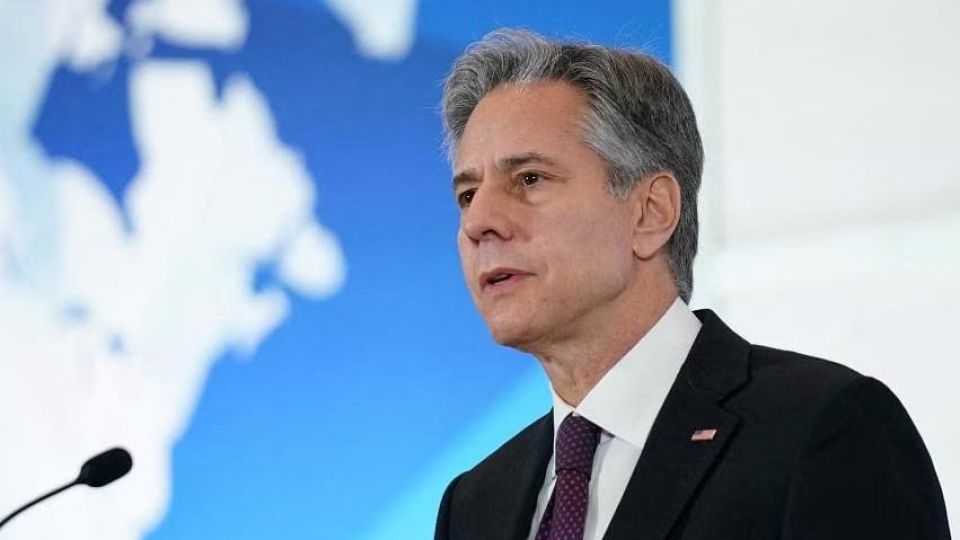June 19, 2023
WASHINGTON – United States Secretary of State Antony Blinken’s trip to Beijing aims to build open communications with China, amid low expectations of any breakthrough in the rancorous relationship.
Hours before his departure on Friday to Beijing, Mr Blinken told reporters: “Intense competition requires sustained diplomacy to ensure that competition does not veer into confrontation or conflict.”
The first objective of his trip is to establish “open and empowered communications so that our two countries responsibly manage our relationship, including by discussing challenges, by addressing misperceptions, and avoiding miscalculations”, he said.
The trip is also to advance US interests and values and those the country shares with allies and partners, “including speaking directly and candidly about our very real concerns on a range of issues”, he added.
The US will also explore the potential for cooperation on transnational challenges such as global economic instability, illicit synthetic drugs, climate change and global health.
When asked if he was optimistic that his trip could lead to more interactions, Mr Blinken said it was in line with what President Joe Biden and his Chinese counterpart Xi Jinping had agreed on when they met in Bali in November 2022 – which was to establish sustained, regular lines of communication at senior levels across governments.
“If we want to make sure, as we do, that the competition that we have with China doesn’t veer into conflict, the place you start is with communicating,” he added. “We’ll see what comes from this visit.”
Mr Blinken will hold talks on Sunday and Monday in Beijing, including with Chinese Foreign Minister Qin Gang.
It is the first trip to China by a top US diplomat in nearly five years.
In February, Mr Blinken called off a planned trip to Beijing due to a row over an alleged Chinese spy balloon flying over the US. America eventually shot it down, and the incident plunged US-China relations to a new low.
Mr Blinken also has to contend with China hawks in Washington – especially in Congress, where many view China as an enemy – who compete with one another to be more hawkish, and are ready to pounce on any hint of the Biden administration being soft on Beijing.
Mr Qin, in a phone call with Mr Blinken ahead of his visit, told the latter that the US should “stop interfering in China’s internal affairs, and stop harming China’s sovereignty, security and development interests in the name of competition”, said a statement from China’s Foreign Ministry on Wednesday.

Mr Antony Blinken will hold talks on Sunday and Monday in Beijing, including with Chinese Foreign Minister Qin Gang (above). PHOTO: AFP
Dr Michael Swaine, senior research fellow at the Quincy Institute for Responsible Statecraft think-tank, said on a webcast on Thursday that it was a good thing to have low expectations.
The trip is “possibly the beginning of meetings that will put a floor under the relationship, reduce tensions to some degree and provide a basis for cooperating or developing lines of cooperation in the future”, he said. “But it’s the first step in what I think is going to be a fairly steep uphill climb.”
Dr Patrick Cronin, chair for Asia-Pacific Security at the Hudson Institute, told The Straits Times: “The best that can be expected is that China and the United States will keep robust diplomatic channels open, even if little tangible agreement emerges in the near term.”
Ms Bonnie Glaser, director of the Asia Programme at the German Marshall Fund of the United States, said the best outcome would be an agreement to reinvigorate communication channels that have fallen into abeyance, in particular, military-to-military ones.
Other best-case outcomes would be to “restart cooperation on issues where there are convergent interests (climate, food security, global health), and to hold more bilateral engagements”, she added.
But she cautioned: “I don’t think China wants to give Blinken a win.”
Analysts in China are also pessimistic that the visit will improve strained ties.
Professor Shi Yinhong, centre director of American studies at Beijing’s Renmin University of China, said: “It has been demonstrated again and again… that communication itself so often means so little.”
He does not expect the visit to produce anything, “except, I hope, the will and mechanism of preventing China-US military conflict might be strengthened”.
Dr Henry Wang Huiyao, founder of the Centre for China and Globalisation, said it would take a miracle to improve China-US ties.
“If the two sides can reach a behind-the-scenes consensus or agreement to resolve their differences without resorting to war, it will be a good result. Ideally, a non-aggression pact similar to the one between the Soviet Union and Germany before World War II,” he added.
At a joint press conference with Mr Blinken on Friday, visiting Singapore Foreign Minister Vivian Balakrishnan was asked for his perspective on US-China relations.
He said “there are many global, planetary issues – climate, pandemics, even cyber security – which require the United States and China to work off the same page and be key pillars for a global system, which will help increase resilience to threats to welfare, health and prosperity for people all over the world”.
“The trip is essential, but not sufficient,” he added.
“There are fundamental differences in outlook, in values. And it takes time for mutual respect and strategic trust to be built in. So it’s important, but… I hope people don’t have excessive expectations on that front.”
Additional reporting by Aw Cheng Wei.


